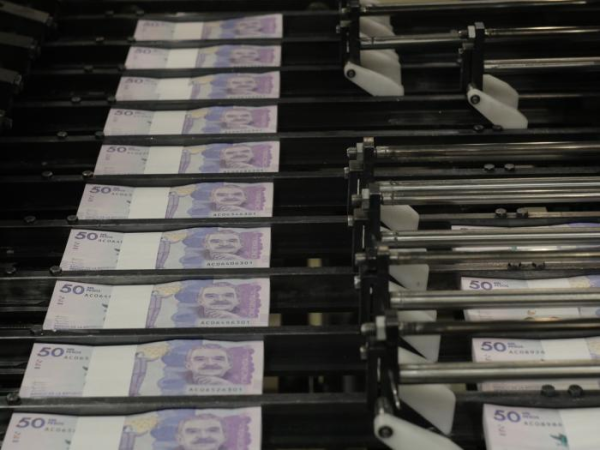Last week, President Gustavo Petro again showed his dissatisfaction with the monetary policy measures that the Banco de la República has taken since September 2021, and that, in order to contain inflation, they have taken the Issuer’s interest rate to a level of 10%.
(The slowdown and interest rates, the great global challenges).
“The Bank of the Republic has raised the interest rate from 1.75% to 10% in one year, will it allow growth? Will it allow the economic reactivation that has been talked about so much? the development of the popular economy? (…) So why do we do it? The interest rate has grown, globally we have a recession in sight, and the increased interest rate in Colombia will serve as a transmission belt of the world recession within the Colombian economy”, Petro said in the National Congress of Acopi.
But for experts, the relationship between intervention rates, inflation, and growth is a matter with several nuances.
“It is a complex issue, because the origin of the economic malaise really has to do with the problem of energy prices, the supply chain and the slowdown in China that is caused by covid. What interest rates are responding to is that inflationary shock that is taking shape globally”explained José Ignacio López, executive director of economic research at Corficolombiana.
According to the expert, what the increases in interest rates are trying to do is prevent that inflationary shock from being persistent or generating inflation expectations that are prolonged over time.
(Banrep vs. inflation: what is the Issuer doing to lower prices).
“Interest rates are not the origin of the recession. They are a response to the shock that the economic slowdown is generating, but in that discussion the monetary policy response must be well calibrated and that is what all the central banks are trying to do, and it is not an easy task. A bad calibration can lead to a contraction in economic activity due to very high real interest rates”, argued López, who assured that in Colombia the rates are not at very high levels in real terms.
For her part, Carolina Monzón, manager of economic research at Itaú Colombia, said that the increases in interest rates have been the consequence of an inflation that has been surprising the world with increasing growth. According to Monzón, the essence of inflation means that there may be significant slowdowns in the economies for the following year. “The central banks are trying to contain these pressures, the macroeconomic imbalances that the countries have, high levels of debt, of external deficit, which can accentuate the risks much more at a time like these of high inflation”assured.
José Antonio Ocampo, Minister of Finance and Leonardo Villar, manager of Banco de la República.
According to the economist, the origin of inflation seems to be based not only on supply shocks, but also on a recovery in demand as a result of the post-pandemic.
“Yes, we are going to see a sharp slowdown in the economies next year, but the central banks are also using the tool they have available, the interest rate, because in the face of higher levels of inflation, purchasing power is contained. The great challenge that the monetary authorities are seeing is trying to control prices even when we see a slowdown scenario in terms of activity”, Monzon said.
Munir Jalil, BTG Pactual’s chief economist for the Andean region, agreed with López that ‘everything starts with inflation’, and ensures that this has two origins: demand factors and supply factors.
(Why entrepreneurs already feel the weight of interest rates).
“Some people, who I would dare to say are the ones who put a political spin on things, say that inflation is a supply phenomenon, and come to the conclusion that there is no need to make rate movements to control inflation. We have those who truly believe that inflation is generated by both phenomena, and we understand that a strong response from central banks is necessary. That’s where the discussion starts.”said.
Jalil reiterated that, in the particular case of Colombia, which is one of the fastest growing economies in the world, credit has also been growing at rates of more than 20%, and questioned that given that in the first semester there was a dynamics of consumption too shot, “Being able to continue saying in the face of this evidence that the inflationary phenomenon is only supply-side, we get out of a technical argument and enter into an ideological argument.”
Khalil argued that “acting with little forcefulness is paying”but that the rise in interest rates is going to slow down the economy because it will make credit more expensive and through that it slows down consumption.
“In the same way that you cannot cover the sun with a finger from inflation generated by demand factors, we would be wrong to say that raising rates will not slow down the economy, because that is the objective,” Khalil concluded.
Prospects for next year point to low growth
By 2023, a global slowdown is expected, which will affect both large economies and emerging countries.
Last week the International Monetary Fund (IMF) revised its projections, and assured that world economic activity is experiencing a stronger than expected slowdown and with higher inflation than that registered in recent decades.
For Latin America and the Caribbean, the IMF lowered its forecast for 2023 by three tenths, to 1.7%. In the specific case of Colombia, although the agency forecasts that it will have the best performance in the region in 2022 (7.6%), the IMF also cut its projection for next year, to 2.2%.
In recent weeks Colombia has also seen a reduction in forecasts from various entities, the Ministry of Finance lowered its bet to 1.8%, while the Bank of the Republic expects just 0.7%.
Laura Lucia Becerra Elejalde
BRIEFCASE








